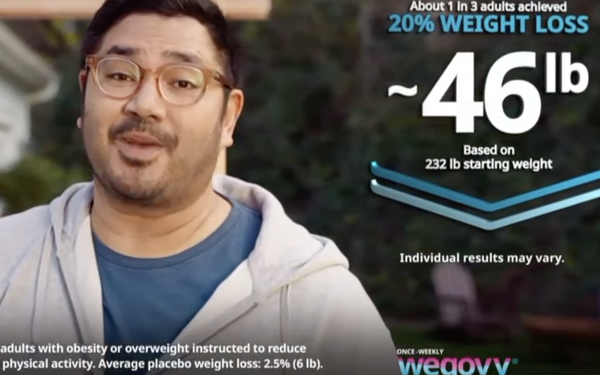
In a busy time on the GLP-1
front, Novo Nordisk on Tuesday reported filing 14 new lawsuits against companies it says are selling “unsafe and unapproved compounded drugs claiming to contain ‘semaglutide,’”
the component of its Ozempic and Wegovy meds. The company has now filed more than 120 such lawsuits in the U.S.
A week earlier, the FDA had issued its latest alert on compounded GLP-1 drugs,
warning of risks in safety, effectiveness and quality. And Novo Nordisk had lowered its sales guidance for the year, citing reduced expectations for U.S. GLP-1 sales due largely to “the
persistent use of compounded GLP-1s.”
Novo Nordisk said the targets of its lawsuits include telehealth companies selling compounded semaglutide “under the false guise of
personalized medicine.”
advertisement
advertisement
However, the company has not sued Hims & Hers, the subject of a very public breakup between the two entities in June, less than three months after the major
telehealth player began selling Wegovy, with Novo Nordisk citing deceptive marketing practices as a cause.
Releasing Q2 earnings on Monday, Hims & Hers Co-Founder and CEO Andrew Dudem said
users of its personalized GLP-1 treatment plans had lost an average 10.3% of their body weight over six months, and that only 25% of them had discontinued treatment, “particularly encouraging
when considering discontinuation rates in certain publicly available studies reached approximately 80% percent by six months.”
Saying that personalized treatments allow patients
“to receive clear treatment instructions and educational content while also accessing tools such as water intake trackers and calorie counters,” Dudem complained of “pushback from
traditional incumbents.”
During its own earnings call on Wednesday, Novo Nordisk doubled down against GLP-1 compounders that it says are still around despite the end of an FDA-granted
grace period in May.
An estimated 1 million patients are on compounded GLP-1s in the U.S., David Moore, Novo Nordisk’s executive vice president of U.S. operations and global business
development, said during Wednesday’s earning call. That compares with 280,000 weekly Wegovy users.
Wegovy, which, unlike Ozempic, is specifically indicated for weight loss, did garner a
37% year-over-year U.S. sales increase in the first half of 2025. While lower than had been expected, Moore pointed to positive factors like the March launch of Novo Nordisk’s D2C NovoCare
Pharmacy, which already accounts for 10% of Wegovy prescriptions. Moore said Novo Nordisk would continue to invest in D2C initiatives, not only with NovoCare, but -- despite its ill-fated Hims &
Hers venture -- with other telehealth companies.
Besides the compounders, Wegovy continues to face formidable competition from Eli Lilly’s Zepbound, whose own growth appears to
have no bounds. Zepbound, only sold in the U.S., saw its sales soar 172% Y-o-Y in the second quarter, per earnings results released Thursday morning. Zepbound now accounts for two-thirds of the U.S.
market, noted Lilly CFO Lucas Montarce.
Dave Ricks, Lilly’s CFO, also complained about the compounders. “Regulators and law enforcement officers need to step up their game to
really eliminate them,” he said, “because people are being harmed.”
One crimp in Zepbound’s armor could be Wegovy’s new status as the only GLP-1 obesity
drug covered by CVS Caremark, one of the three leading pharmacy benefit managers, which went into effect July 1.
Wegovy could also be helped by Novo Nordisk’s expectation for approval of
an oral version by end of year. Lilly also hopes to have an anti-obesity pill approved sometime next year. It’s orforglipron, a different GLP-1 from Wegovy’s semaglutide or
Zepbound’s tirzepatide. An oral semaglutide option has already been a key factor in Hims & Hers’ sales demand, that firm’s CFO Yemi Koupe noted.
Meanwhile on
Monday, another leading telehealth player, Noom, announced a GLP-1 microdosing program, priced from $119 to $199 a month, which it said would minimize semaglutide side effects.
“Many
people discontinue GLP-1 treatment because of side effects,” Dr. Jeffrey Egler, Noom’s chief medical officer, said in a statement. “The Noom Microdose GLP-1 Program was designed to
address this issue by introducing GLP-1s gradually and sustaining them at a microdose level, as part of a larger holistic behavior change platform.”